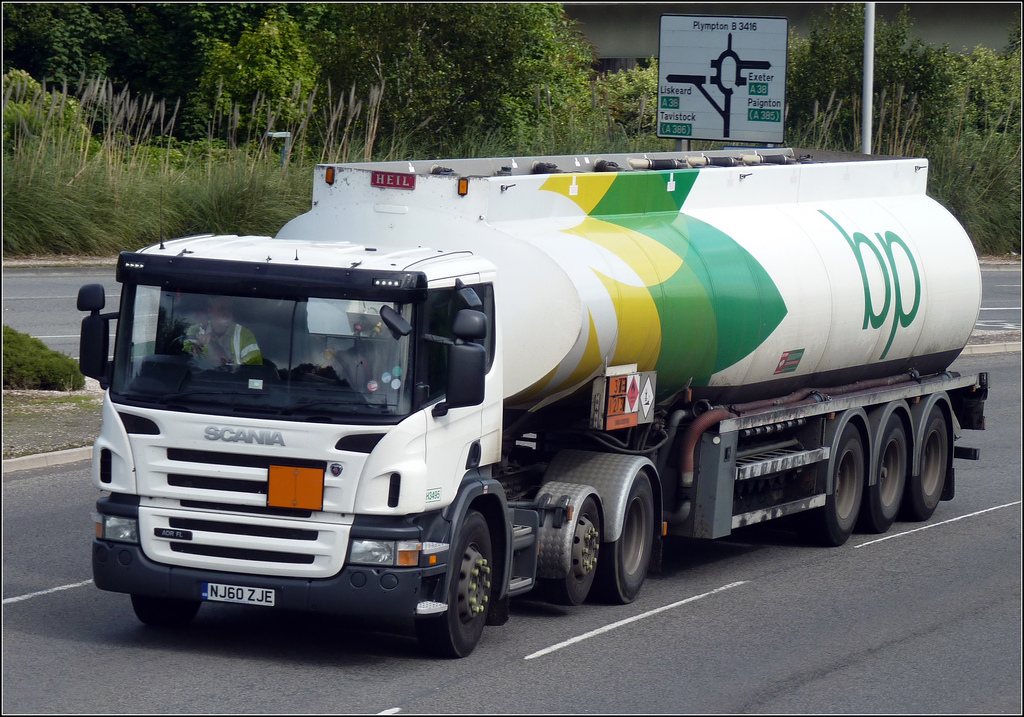For the most part, the British giant missed the early stages of the American oil revolution. Trying to recover from consequences of explosion of the Deepwater Horizon oil drilling platform in 2010 and pay off compensations and fines, the company spent several years trying to sell its own assets worth $ 80 billion.
Then, British Petroleum regretted something, for example, the sale of 160,000 hectares in the Permian oil and gas basin. Then in 2010, the oil corporation Apache immediately bought up the field for $ 3 billion. Nevertheless, the British company still had about 2.5 million hectares of deposits in the United States, which brought 300,000 barrels of oil daily, mainly in the San Juan basin in the state New Mexico and Green River in Wyoming. However, British Petroleum simply did not have really profitable wells such as those that could be in the basins of Bakken, Marcellus, Utica or Eagle-Ford, did not exist.
To start afresh, the British oil giant decided to buy a stake of almost 200,000 hectares from BHP Billiton, where 190,000 barrels of oil and an equivalent volume of gas are produced daily. This share includes almost 100,000 hectares in Eagle-Ford, 34,000 hectares in the Permian basin and 77,000 hectares in Haynesville. By the way, there are quite enough undeveloped deposits for thousands of new wells.
How beneficial is the deal for British Petroleum? Oswald Clint, an expert from the consulting agency Bernstein Research, admits: "At first, the outlook for this company was disappointing for us. But in fact, the business model of British Petroleum proved to be very effective." According to Jason Gabelman of the financial firm Cowen & Co., the transaction cost the British Petroleum $ 2 per share. Gabelman himself likes companies with more extensive economic resources than the assets of BHP Billiton, through which gas and gas condensates are produced, rather than high-quality oil. According to the analyst’s estimates, British Petroleum pays $ 7,400 per hectare in Haynesville, and $ 44,500 per hectare in the Perm basin and the Eagle-Ford fields. In addition, the daily production of 190,000 barrels of products costs $ 4.9 billion, and one barrel of oil equivalent per day thus costs about $ 25,000.
Hopefully, British Petroleum will be luckier than BHP Billiton. After all, it would seem that back in 2011, the then general director Marius Kloppers liked the idea of hydraulic fracturing and paid $ 4,75 billion for Fayetteville Shale, Arkansas, to the founder of the oil and gas corporation Chesapeake Energy. A few months later, BHP Billiton raised rates fourfold and redeemed Petrohawk Energy together with its 400,000 hectares of deposits in Eagle Ford and the Perm basin in Texas for $ 15 billion (with a 50% premium). Then, BHP Billiton Corporation was one of the largest mining companies in the world, without drilling a single well.
Some investors of BHP Billiton began to worry, but Kloppers was unperturbed. He told in an interview with Forbes in 2012: "Shale gas is just like coal. The deposits are very extensive, and one can find a position from which gas production will be the most efficient and least expensive." The company had a cloudless future according to its head: Kloppers was going to thoroughly study the market of energy production in the US and apply the experience gained in other countries of the world. But everything was not so simple. When the corporation was engaged in mergers and acquisitions, one thousand cubic meters of natural gas cost $ 152, and a barrel of oil - $ 100. Today, the cost of natural gas fell to $ 100, and oil - to $ 70. A year after the new acquisitions, BHP Billiton lowered the price of shale deposits by $ 2.8 billion, and Kloppers lost the annual premium. In early 2013, he resigned.
A couple of weeks ago, the company announced sale of Fayetteville's fields in Arkansas to private energy company Merit Energy. The transaction amounted to $ 300 million, $ 4.4 billion less than BHP Billiton paid seven years ago. The company called the deal "a complete sale in two simple steps." In addition, BHP Billiton is expected to receive an additional $ 2.8 billion to sell assets at a reduced price. The corporation never earned on assets due to high depreciation expenses for a huge amount of purchase.
The sold assets will fall into the hands of managers rushing into battle. Three years ago, General Director Robert Dudley decided to transfer the British Petroleum’s deposits development business in the continental US to the ownership of its subsidiary, run by David Lawler. In 2016, Lawler told Forbes editors that the new drilling technology will open access to the ocean of cheap oil and gas even in small and medium field area. Then he noted that he did not see the need to overpay for production in widely advertised fields: "When we started getting the first figures, London began to give us even more money." Apparently, the management likes effectiveness of the American unit.
So, can we expect new mergers and acquisitions now that British Petroleum is interested in new acquisitions once again? The largest such transaction took place in 1999. Then the British giant bought the oil company ARCO for $ 27 billion. Today, the corporation could buy out the company Resolute Energy, which was its partner in the development of deposits in the Perm basin, for one billion or so. Besides, there is one more option: to establish an independent public enterprise for the oil and gas business in the continental US. By the way, this possibility has been discussed quite often since this business was transferred to the subsidiary.
As for BHP Billiton, the company now decided to focus on more "traditional" methods and assets with all its rich experience. Recently, the company has drilled wells in the Gulf of Mexico and Trinidad and Tobago, and so far things are going well for it.
source: forbes.com
Then, British Petroleum regretted something, for example, the sale of 160,000 hectares in the Permian oil and gas basin. Then in 2010, the oil corporation Apache immediately bought up the field for $ 3 billion. Nevertheless, the British company still had about 2.5 million hectares of deposits in the United States, which brought 300,000 barrels of oil daily, mainly in the San Juan basin in the state New Mexico and Green River in Wyoming. However, British Petroleum simply did not have really profitable wells such as those that could be in the basins of Bakken, Marcellus, Utica or Eagle-Ford, did not exist.
To start afresh, the British oil giant decided to buy a stake of almost 200,000 hectares from BHP Billiton, where 190,000 barrels of oil and an equivalent volume of gas are produced daily. This share includes almost 100,000 hectares in Eagle-Ford, 34,000 hectares in the Permian basin and 77,000 hectares in Haynesville. By the way, there are quite enough undeveloped deposits for thousands of new wells.
How beneficial is the deal for British Petroleum? Oswald Clint, an expert from the consulting agency Bernstein Research, admits: "At first, the outlook for this company was disappointing for us. But in fact, the business model of British Petroleum proved to be very effective." According to Jason Gabelman of the financial firm Cowen & Co., the transaction cost the British Petroleum $ 2 per share. Gabelman himself likes companies with more extensive economic resources than the assets of BHP Billiton, through which gas and gas condensates are produced, rather than high-quality oil. According to the analyst’s estimates, British Petroleum pays $ 7,400 per hectare in Haynesville, and $ 44,500 per hectare in the Perm basin and the Eagle-Ford fields. In addition, the daily production of 190,000 barrels of products costs $ 4.9 billion, and one barrel of oil equivalent per day thus costs about $ 25,000.
Hopefully, British Petroleum will be luckier than BHP Billiton. After all, it would seem that back in 2011, the then general director Marius Kloppers liked the idea of hydraulic fracturing and paid $ 4,75 billion for Fayetteville Shale, Arkansas, to the founder of the oil and gas corporation Chesapeake Energy. A few months later, BHP Billiton raised rates fourfold and redeemed Petrohawk Energy together with its 400,000 hectares of deposits in Eagle Ford and the Perm basin in Texas for $ 15 billion (with a 50% premium). Then, BHP Billiton Corporation was one of the largest mining companies in the world, without drilling a single well.
Some investors of BHP Billiton began to worry, but Kloppers was unperturbed. He told in an interview with Forbes in 2012: "Shale gas is just like coal. The deposits are very extensive, and one can find a position from which gas production will be the most efficient and least expensive." The company had a cloudless future according to its head: Kloppers was going to thoroughly study the market of energy production in the US and apply the experience gained in other countries of the world. But everything was not so simple. When the corporation was engaged in mergers and acquisitions, one thousand cubic meters of natural gas cost $ 152, and a barrel of oil - $ 100. Today, the cost of natural gas fell to $ 100, and oil - to $ 70. A year after the new acquisitions, BHP Billiton lowered the price of shale deposits by $ 2.8 billion, and Kloppers lost the annual premium. In early 2013, he resigned.
A couple of weeks ago, the company announced sale of Fayetteville's fields in Arkansas to private energy company Merit Energy. The transaction amounted to $ 300 million, $ 4.4 billion less than BHP Billiton paid seven years ago. The company called the deal "a complete sale in two simple steps." In addition, BHP Billiton is expected to receive an additional $ 2.8 billion to sell assets at a reduced price. The corporation never earned on assets due to high depreciation expenses for a huge amount of purchase.
The sold assets will fall into the hands of managers rushing into battle. Three years ago, General Director Robert Dudley decided to transfer the British Petroleum’s deposits development business in the continental US to the ownership of its subsidiary, run by David Lawler. In 2016, Lawler told Forbes editors that the new drilling technology will open access to the ocean of cheap oil and gas even in small and medium field area. Then he noted that he did not see the need to overpay for production in widely advertised fields: "When we started getting the first figures, London began to give us even more money." Apparently, the management likes effectiveness of the American unit.
So, can we expect new mergers and acquisitions now that British Petroleum is interested in new acquisitions once again? The largest such transaction took place in 1999. Then the British giant bought the oil company ARCO for $ 27 billion. Today, the corporation could buy out the company Resolute Energy, which was its partner in the development of deposits in the Perm basin, for one billion or so. Besides, there is one more option: to establish an independent public enterprise for the oil and gas business in the continental US. By the way, this possibility has been discussed quite often since this business was transferred to the subsidiary.
As for BHP Billiton, the company now decided to focus on more "traditional" methods and assets with all its rich experience. Recently, the company has drilled wells in the Gulf of Mexico and Trinidad and Tobago, and so far things are going well for it.
source: forbes.com



















